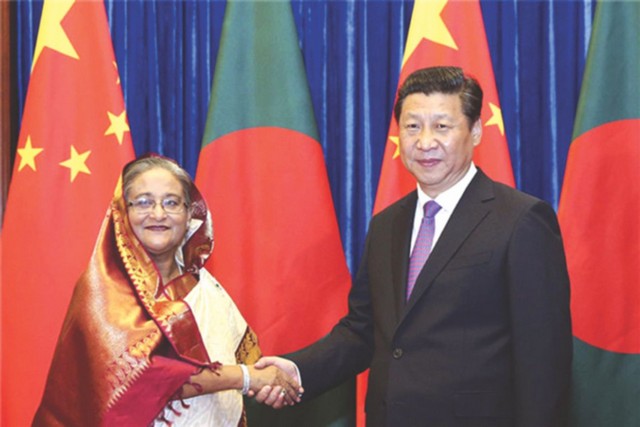By Taj Hashmi
What the Saudi defence minister Mohammad bin Salman al-Saud declared last Tuesday (15th December) about the formation of a so-called coalition of 34 Muslim nations to fight the ISIS and Islamist terror was dramatic, ridiculous, and ominous. It signalled the beginning of a long-drawn war between super powers, and between Muslim nations on sectarian and other more important geopolitical issues.
Nothing could be more ridiculous than assuming that Saudi Arabia, Turkey, Egypt and some other Muslim nations have suddenly decided to crush the ISIS for the sake of global and regional peace. It’s unbelievable that countries like Turkey, who buy cheap oil from the ISIS and treat its injured fighters in their hospitals, can just abandon their protégés for some unknown reasons.
Then again, as there are multiple variables about the nature and outcome of the so-called coalition, made in absolute haste, so are there divergent opinions about how this coalition will work, or won’t work at all. Analysts aren’t sure if the coalition will ever involve military forces anywhere. There’s scepticism about the real motives of Saudi Arabia. Some analysts believe the coalition reflects Saudi Arabia’s desire to prove the Kingdom and its state ideology (Wahhabism) have nothing to do with the ISIS.
Others argue that Saudi Arabia wants to contain the growing Iranian influence in the region, especially in Syria, Iraq, Yemen and Lebanon; and that the coalition reflects Saudi apprehension that the eventual lifting of nuclear-related sanctions against Iran will further strengthen its Shiite adversary. Some analysts believe there are no military implications of the coalition. One of them insists: “At the end of the day this is a political message, not an operational strategic one. It seems very ad hoc.” He believes the coalition is all about containing Iranian influence in the region.
Monish Gulati is quite optimistic about the outcome of the coalition: “The coalition could serve to heal the divide amongst the Sunni Arab countries; the coming together of Turkey and Egypt could bring some positive influence to bear in countries like Palestine where cultural and sectarian rifts have influenced developments negatively. The coalition could even, to the relief of the West, address the refugee issue.” Last but not least, some analysts believe the coalition is aimed at assuaging the world that Muslim nations aren’t indifferent to Islamist terror attacks, and are determined to address the problem.
One, however, doesn’t believe the unilateral declaration by the Saudi defence minister has anything to do with fighting the ISIS and its ilk. One doesn’t believe the coalition will bring the Sunni Muslims together, and will positively impact Palestine, and will address the refugee problem. It seems, the coalition is all about overthrowing the Assad regime in Syria, and eventually containing the Russian and Iranian influence in the region. No wonder, unlike conventional military alliances, which take months and years to germinate, evolve and mature, one single declaration by a Saudi prince ushered in a mega military alliance of 34 nations. Surprisingly, some of the “coalition” members – including Pakistan and Bangladesh – only learnt about their inclusion in the alliance through media reports.
There’s nothing inclusive or Islamic/Muslim about the coalition. Had defeating the ISIS been a motive, Syria and Iraq – the worst victims of ISIS terror – would’ve been in the coalition. The exclusion of Iran makes no sense either. While Saudi Arabia and Turkey have been virtually at war with anti-ISIS forces in Syria, Iraq, and Yemen, one wonders as to how these countries are members of a coalition, purportedly created to crush the ISIS and other Sunni terror outfits across the region! As the Saudi minister asserted, the coalition would be led by Saudi Arabia, which would also host a “joint operations centre” to coordinate efforts. Most importantly, military operations are very much in the agenda of the coalition.
In this backdrop, it’s simply unbelievable Bangladesh has decided to support the coalition, and might send mercenaries to tilt at windmills. What doesn’t seem to have dawned on policymakers in the country is that sending mercenaries to kill innocent civilians in the “neo-war on terror” is altogether a different ball game from sending troops for UN peacekeeping missions. Since Bangladesh came into being by fighting a just war against the perpetrators of an unjust one in 1971, joining an unjust war – a proxy war of super powers and their clients – is reprehensible, least dignified and desirable.
One is afraid, what Bangladesh has earned over the years by taking part in UN peacekeeping missions, would throw away by sending mercenaries to fight proxy wars in the Middle East. Since proxy wars lack transparency and legitimacy, no peace loving country can take part in such wars. Since the Saudi-led coalition isn’t aimed at fighting the ISIS and other Sunni extremists but to contain Iran, Russia and other common enemies of Washington, Riyadh, and Ankara, it’s reprehensible that countries like Bangladesh should send mercenaries just to earn some foreign currency. Last but not least, as per the Constitution, Bangladesh can’t engage in any warfare on behalf of some other country/entity in a foreign land (unless sanctioned by the UN).
Bangladesh has already sent thousands of maids to work for their Arab masters – in the most deplorable condition – to augment its foreign currency reserve. It shouldn’t even think of sending mercenaries to fight someone else’s unjust wars. Self-respect, dignity, and commitment to peace and justice are more important than foreign currency. Nobody respects a nation of coolies, domestic servants and mercenaries.
The writer teaches security studies at Austin Peay State University. Sage has recently published his latest book, Global Jihad and America: The Hundred-Year War Beyond Iraq and Afghanistan.
21 December, 2015
Countercurrents.org

